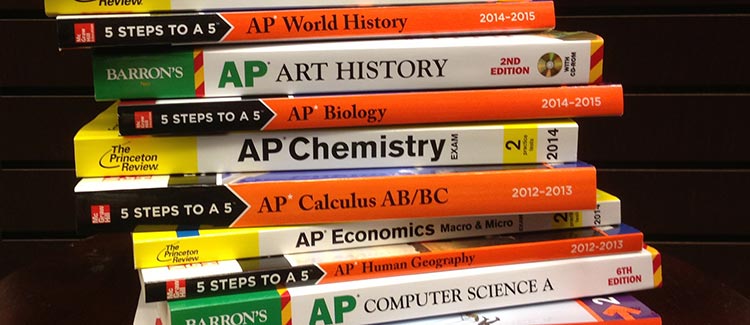COMMENTARY: When Unqualified Students Are Pushed into Taking Advanced Placement Classes, All AP Students Suffer
Let’s just get this out of the way now: many AP classes at Olympic Heights aren’t what we’ve been led to believe. Decreased rigor, increased class sizes, and constant test reform has led to this reality in a cyclical pattern. Yet, every cycle must have a beginning, and this cycle begins with human awareness.
Guidance counselors and administrators recognize that high school students taking AP classes have greater odds of being accepted to top colleges and that these students have increased odds of receiving college credit for successfully passing an AP exam. Thus, guidance counselors are advised to encourage students to take AP classes to help benefit their prospective chances at acceptance to the college of their choice. Yet, when a specific pattern goes unmanaged, it can become uncontrollable, leading to detrimental effects across the board.
According to OH guidance counselor Ms. Katlin McGregor, “about half of our students…close to 1000 [1,145 AP exams were taken in 2016-2017 at Olympic Heights] take AP classes.” To put that into perspective, that number means that the 250th ranked student in each class at OH is currently enrolled in one AP class. This leaves us with two possibilities: either OH has become a haven for intellectuals, or the quality of AP classes has dipped. Predicated on AP test passing rates at OH, the latter seems most likely. Yet, what would cause such questionable behavior? Money.
According to AP English Language teacher Ms. Vanessa Koher, there are some benefits involved: “[AP teachers] make $50 per [passing] student…previously there was a limit of 60 passing students…this year the state legislature decided to eliminate the cap.” And, according to AP U.S. History teacher Mr. Paul Farese: “The money the school gets is substantially more [than the teachers].”
Adjusting for the 60 passing students per teacher rule, AP teachers made a collective $28,200 in AP incentive bonuses. That $28,200 doesn’t account for the unknown amount of money that the school made. While many AP teachers, including AP European History teacher Mr. Michael Taylor, attest that “If teachers are motivated by money than they are missing the point.” The idea that money is an incentive isn’t unrealistic.
According to a 2008 Office of Program Policy Analysis and Government Accountability report, the state of Florida spent $52.9 million on AP class costs, with $30.2 million of those funds directed towards AP incentives. While this report is almost a decade old, no new legislation has been passed since that point to make any significant adjustments. Accounting for inflation, it can be predicted the state spent around $62.1 million on AP classes, with $35.5 million spent solely on teacher incentives.
Ms. Diana Fedderman, the Assistant Superintendent Curriculum for The School District of Palm Beach County, believes that this funding “provides…teachers with the monies necessary to participate in professional development, prepare coursework, and dedicate the amount of planning time necessary to teach a successful AP course.” Yet, when Taylor was asked if the money teachers made on incentives benefited the students in any way, his response was a simple “Not really.”
It is easy to see that guidance counselors are encouraging kids to take AP classes. A comparison of any AP class at the beginning of the year to the start of the second semester usually provides enough observation as many AP classes will begin at 35-40 students and plummet to 20-25. AP Art History and AP English Literature teacher Ms. Gina Woods states that while she “likes to see [her students] challenge themselves,” she also made it clear that “[students] will very quickly figure out if [the AP class] is for them.” If these students have figured it out so quickly, why were they in such a class to begin with? Every teacher interviewed unequivocally agreed that a larger portion of students than acceptable did not belong in their classes. The notion of disregarding these students’ impact on the quality of AP classes is, however, completely irresponsible.
Long-time AP Language teacher Ms. Deborah Posner had this to say about the rigor of her classes: “[My] students have said, ‘this class is harder than ENC 1101 at FAU’ but that doesn’t compare to [the same class] at a prestigious school…[my class] would not be relatively comparable to a college level class.”
AP classes were once reserved for only the brightest of students. According to Farese, students would only take “two to three AP classes throughout all of high school.” This was because the rigor of AP classes once matched that of legitimate college courses. However, according to the Harvard Education Press book AP: A Critical Examination of the Advanced Placement Program, while more students are taking AP classes, the growth of College Board AP classes has reached the point of “diminishing returns.” According to a College Board report, the number of AP test-takers has increased by over 1,000% since 1994, but the average AP score has dipped from 3.07 to 2.89, meaning that the average student in an AP class will fail the exam.
The fact is, most AP classes are not the equivalent to the college-level course. It is telling that most colleges rarely give college credit for passing an AP exam. This may be because it wouldn’t be profitable for colleges to offer credit for every passed exam, considering how many AP classes students take. Alternatively, withholding college credits could be attributed to colleges not believing that AP classes are equivalent to college courses. If top colleges recognize this reality, why don’t we?
Posner, however, feels colleges should share some of this blame, stating “If [my rigor] is what college level is, that is a problem. I’m meeting their standards, but I’m disheartened by the fact the standards are that low.”
Now, this is not to say all AP classes fail to become a college equivalent. AP courses at OH such as AP Chemistry, AP Biology and AB/BC Calculus are notorious for their rigor in comparison to others. AP Biology teacher Ms. Sarah Rew recounts, “Students that take AP Biology and that take another form of biology in college come back to me and say, ‘This is so easy compared to [AP Biology].”
However, other AP teachers are feeling pressured to lower course rigor. An OH AP teacher wishing to remain anonymous claims that such pressure has been applied to his/her teaching strategies. This teacher ran the AP classes like a college level class, yet, according to the teacher, students were struggling. Even though this teacher was motivated to challenge the students with college-level coursework, the teacher claims he/she was told by an OH administrator to “offer much easier grades to allow students to pass the class, even if these students have no intention of passing the AP exam.” This story is echoed by multiple teachers as they feel that too many inadequate students and pressure from administration prevents them from running their classes at a college-level.
In response, OH principal Dave Clark acknowledged that OH is motivating more students to take AP classes. “Are there more kids in AP classes? Sure. But that is because of district initiative,” Clark explained. He adds that studies show that even if students don’t pass AP tests, they will be more successful in college by virtue of taking the AP class. “In no way is our administration instructing teachers to dilute their classes; it is up to the students to bring themselves to the rigor of these classes,” Clark adds.
Posner echoes Clarks sentiment in that regard, saying, “Students have to expect that the curriculum will not be watered down for them.”
While AP classes, whether one passes the exam or fails, do help students prepare for college, it is not as clear-cut as it sounds. According to Ysaura Olivo, assistant director of admissions at California State University, failing an AP exam “could potentially affect [students] eligibility for college admissions.” The noble claim that taking AP classes can only help doesn’t hold in the college sphere and could end up causing irreparable damage to a student’s academic record. The end result is that such “encouragement” can do more harm than good.
This shows itself in the AP pass rates as well. Last year at OH, six AP classes had exam passing rates lower than 50%: AP U.S. History, with a 47% (34/74) passing rate, BC Calculus, with a 33% (8/24) passing rate, AP Statistics, with a 21% (4/19) passing rate, Physics 1, with a 12% (10/83) passing rate, AB Calculus, with an 8% (8/102) passing rate, and Physics 2, with an astounding 0% (0/15) passing rate. And Farese, who oversaw the disappointing AP U.S. History scores, claims his classes had a down year because “pressure from parents and others forced me to adjust my teaching habits.”
It is unlikely that these stories are the first of their kind and it is unlikely they will be the last. The rearing head of duplicity has manifested itself in our very own hallways. It has manifested itself in some of the administrators and teachers we trust with our educational future. Its manifestation impacts each AP student at a fundamental level. In no way should any form of grade saving be offered in an AP class. AP classes are supposed to be hard; they are supposedly “college-rigor.”
The fact that a freshman could be found within an AP class used to be celebrated, yet, since according to Farese, “AP classes are handed out like gumdrops,” this is no longer the case. As AP classes are littered with students who don’t have the ability to succeed in these classes, some have been watered down to accommodate. And who suffers? Real AP students. These students, the students who have the intelligence, the work ethic, and the wherewithal to succeed in a college-level class are shortchanged and hoodwinked with an indolent excuse of a college-level equivalent.
It shouldn’t be like this. Students should be able to choose their classes without pressure from administration or guidance counselors. Students should be allowed to fail without intervention from administration. College-level classes should be reserved for college-level high-schoolers, and not being in an AP class shouldn’t disqualify one from claiming intelligence. Teachers should have the expenses of an AP class covered, like they do in Alabama, Arizona, and California, but not have their pockets lined by a corruptible system.
Yet, this ship hasn’t totally sunk. If administration is willing to check themselves and check AP classes for true college rigor, if the legislatures are willing to devise a more reasonable method of AP incentives, this ship can be righted. Either that, or we recognize that AP classes weren’t what we’ve been lead to believe.










